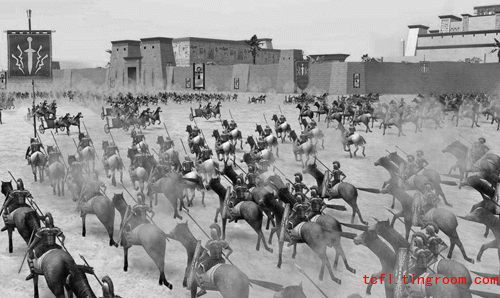| 春秋时期,齐国对鲁国发动战争。齐国实力比较强。鲁国由鲁王亲自带兵迎战。两军在一个叫长勺的地方相遇了。鲁王正准备下令发动进攻,他的将军曹刽阻止道:“等等,现在还不行。”于是,他们爬上一处高地观察齐军的队形。这时,齐军营中响起战鼓声,士兵们向鲁军冲来。鲁王想迎战,又被曹刽阻止。过了一会儿,齐军又敲响战鼓,发起进攻,鲁王又想迎战,但又一次被曹刽阻止。齐军两次徒劳的进攻降低了士兵们的士气。接着,齐军又发起了第三次进攻,鲁王听从曹刽的建议依然不理会。齐军的士气更加低落了,士兵们都感到累了,就坐下来休息。这时,曹刽对鲁王说:“我们的机会到了,可以进攻了。”于是,鲁军发动了进攻,士兵们都勇猛地冲向了敌人。齐国的士兵都吓得四处逃命。最后,鲁国打赢了这场战争。 开始,人们用“一鼓作气”来比喻第一次鼓声促发的战斗力量是最强大的。后来,这句成语被用来比喻将一件事坚持做完,中间没有中断。 |
|||
|
|||
| Press on to the finish without letup | |||
 During the Spring and Autumn Period (770-476BC) , the State of Qi launched an attack against the State of Lu. Qi was much stronger than Lu. The King of Lu led the army by himself. The two parties met at a place named Chang Shao. When the King of Lu prepared to start the offensive, Cao Gui, his general, stopped him and said: "Wait a moment! The time has not come." Then they came to a high stage to observe the battle formation of the Qi's army. At this time, they heard the sounds of drumming and saw the Qi's army charging head-on. The King of Lu wanted to rebut the charge but Cao Gui stopped him again. After a while, the Qi's charged for the second time. But the Lu's took no action. The Qi soldiers' morale lowered after two vain attempts. After the third vain advance attack, the morale greatly declined. The soldiers were so tired that they sat down to rest. "Now, our chance has come!" said the general. Then the Lu's army attacked the enemy bravely. The Qi army fled helter-skelter .At last the Lu has won the battle. During the Spring and Autumn Period (770-476BC) , the State of Qi launched an attack against the State of Lu. Qi was much stronger than Lu. The King of Lu led the army by himself. The two parties met at a place named Chang Shao. When the King of Lu prepared to start the offensive, Cao Gui, his general, stopped him and said: "Wait a moment! The time has not come." Then they came to a high stage to observe the battle formation of the Qi's army. At this time, they heard the sounds of drumming and saw the Qi's army charging head-on. The King of Lu wanted to rebut the charge but Cao Gui stopped him again. After a while, the Qi's charged for the second time. But the Lu's took no action. The Qi soldiers' morale lowered after two vain attempts. After the third vain advance attack, the morale greatly declined. The soldiers were so tired that they sat down to rest. "Now, our chance has come!" said the general. Then the Lu's army attacked the enemy bravely. The Qi army fled helter-skelter .At last the Lu has won the battle.Originally, the idiom means "The fighting strength in the first drums is the highest." Later, it has been used to say "to press on to the finish without letup". |
 English
English Japanese
Japanese Korean
Korean French
French German
German Spanish
Spanish Italian
Italian Arab
Arab Portuguese
Portuguese Vietnamese
Vietnamese Russian
Russian Finnish
Finnish Thai
Thai dk
dk